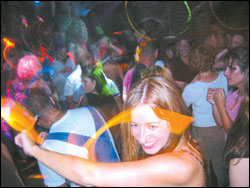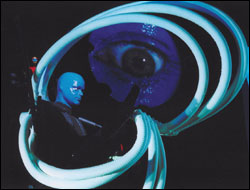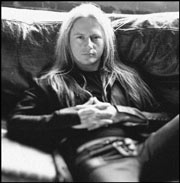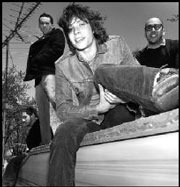IT’S NEARING MIDNIGHT on Saturday, July 5, and the dance floors, bars, staircases, hallways, and bathrooms of the three-level Fenix Underground in Pioneer Square are packed. On the ground floor, revelersmany barely 21are singing along with cover band Hit Explosion’s renditions of disco oldies “Celebration” and “Funky Town.” Downstairs, DJ Trent Von and his dancers have turned the darker, more intimate Fenix cellar into a sauna. All over, 17 bartenders at five bars are pouring nonstop. The new Fenix Underground, open barely a month and a half, is back with a vengeance.
“This is what we expected July Fourth,” says co-owner Rick Wyatt as he swoops from room to room. Six feet 5 inches tall, longhaired, and always dressed in black (including the little black motorcycle chain from which his reading glasses dangle), Wyatt still embodies the affectionate moniker he earned a decade ago: the Prince of Darkness.
“I really thought everyone would be too hung over to come out tonight,” he says, looking around. “I guess they were saving it up.”
There are at least three bachelorette parties going on: girls wearing fuzzy white halos or veils with red horns. One guest of honor, her veil embroidered with “Bride to Be,” stands somewhat dumbfounded in the foyer. Asked if she’d ever been to the old Fenix, she shakes her head no. “This is my first time,” she says. “I had no idea.”
THE ORIGINAL FENIX stood at Second and Jackson until Feb. 28, 2001, when the Nisqually earthquake, registering 6.8 on the Richter scale, caused irreparable damage to the building. Parts of the Fenix’s upper facade fell, smashing the windshields of several parked cars and leveling some parking meters. The quake was the climax of a particularly dark week for Seattle’s old town. The night before, Fat Tuesdaythe last gasp of Mardi Grashad come to a brutal, bloody conclusion, with rioting in Pioneer Square.
“With the crowds and cops and gas,” says Wyatt, “I wouldn’t let customers out of the club till like 3:30. It wasn’t safe. The next day I knew I’d be facing the press, but I was still in bed when the quake hit. I turned on the television, and all these TV guys who had gone to Pioneer Square to do the riot story were doing the earthquake story instead. I thought, ‘Thank God we’re no longer the top story.’ Then they showed the Fenix, the rubble, the cars flattened. The Fenix became the poster child for the quake. After a week, we knew the building was gone. So we had a dinner for the employees to let them know what was going on.”
Wyatt’s partner, Mike Lagervall, was determined to rebuild the club. “Mike led the charge,” says Wyatt. “Two weeks later, we met with the architects, found the [current] site, and started figuring out where the money would come from. We got over a million from FEMA, which helps small businesses with disaster relief.” John Goodman, the landlord of the old Fenix and owner of the new building, offered aid.
Rebuilding the business from the ground up took two years. The nightclub business is notoriously fickle, but in some ways the delay was a boon to the Fenix. In a city where a nightclub’s lifespan tends to top out at five years (see the recent closings of the Paradox and Sit and Spin), Wyatt lucked into a new generation of customers who had no idea what the Fenix had been.
“I used to say I hatched a new batch of fresh 21-year-olds every year. So I missed two batches,” he says. “And some old regulars don’t get out much anymore, although we have seen familiar faces. But everyone who’s come in, new or old, has told me how much they like what we’ve done. It wasn’t reinventing the wheel, just making it better. We have video screens everywhere, so you always know what’s going on. The sound doesn’t leak from room to room. We’re so well insulated, you can’t hear the music on the street. And yet, I think we’ve really held on to the vibe that was the old Fenix. I like to think it’s shiny without being slick.”
As for the music, Wyatt is more than comfortable kicking off with friends like Hit Explosion. “A lot of uninformed people didn’t get it. But they were like our house band. I also needed to see if this was going to work, so I was conservative. Now, I’m contacting every agent that ever ran a band through the old club.” The Fenix will also put more emphasis on booking national acts, as well as local non-cover bands.
Wyatt was also instrumental in the effort that prompted the city to repeal the Teen Dance Ordinance, which limited all-ages shows, though his stance on the matter has eased a bit. “It’s all being handled by agents now, and they want every show to be all ages. I don’t agree with that,” he says.
Wyatt’s next project: trying to open an after-hours club. “The powers that be think anyone up at 4 a.m. is this criminal element, and they’re not,” he says. “It’s the big corporations in Vegas who really developed 24-hour clubs, and now people everywhere, not just Seattle, are looking for that. I’d also like to keep the bars open later. There are other cities that shut down at 4 a.m.why not us? People are starting their evenings later and later, and there are only so many hours in the day. I just want to keep it happening until I can retire and turn it over to the next generation. And hopefully,” he says with a smile, “for a profit.”








